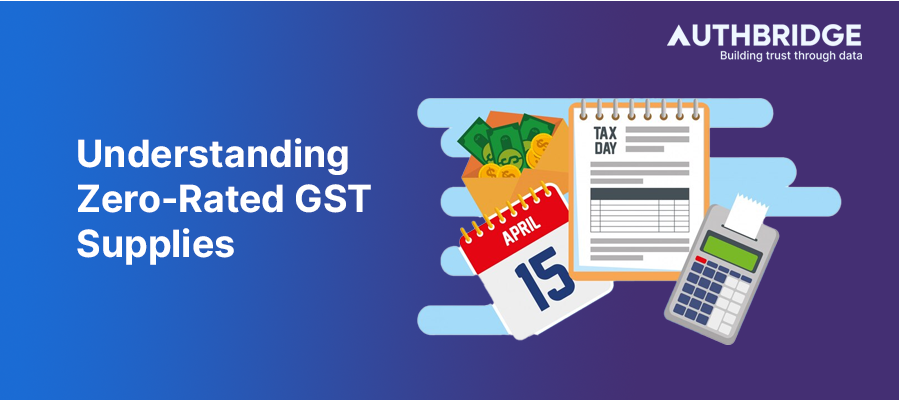Everything You Need To Know About Zero-Rated GST Supplies

The Goods and Services Tax (GST) regime in India introduced a concept that has been a boon for exporters and suppliers to Special Economic Zones (SEZs): zero-rated supplies. This guide delves into the intricacies of zero-rated supplies under GST, highlighting their scope, benefits, and the refund mechanism associated with them. It also differentiates zero-rated supplies from exempt, nil rated, and non-GST supplies, providing clarity on their impact on Input Tax Credit (ITC) eligibility.
Introduction to Zero-Rated Supplies in GST
Definition and Overview
Zero-rated supplies refer to the export of goods and services or supplies to SEZs that are taxed at a rate of 0% under GST. Unlike exempt supplies, suppliers of zero-rated goods and services are eligible to claim a refund of taxes paid on inputs used to manufacture such supplies. This feature is pivotal in preventing the cascading effect of taxes, ensuring that goods and services from India remain competitive in the global market.
Legal Basis and Section Reference
The legal foundation for zero-rated supplies is laid down in Section 16 of the Integrated Goods and Services Tax (IGST) Act. This section explicitly categorizes exports and supplies to SEZs as zero-rated, providing a clear framework for their taxation and refund mechanism.
Scope of Zero-Rated Supplies
Export of Goods and Services
Exports are a critical component of India's economy, and the zero-rating of goods and services ensures that exporters can compete on an equal footing in international markets. By not taxing exports, GST ensures that only the value added within the country is taxed, making Indian exports more attractive.
Supplies to Special Economic Zones (SEZs)
SEZs are designated areas within countries that have different business and trade laws from the rest of the country. Supplies to these zones are treated as zero-rated to encourage investment and economic activity within these zones, contributing to the country's economic development.
Benefits of Zero-Rated Supplies
Enhancing Competitiveness of Indian Exports
Zero-rated supplies under GST have significantly enhanced the competitiveness of Indian exports. By allowing exporters to claim a refund on the GST paid on inputs, the government has ensured that Indian products remain cost-competitive in the global market.
Encouraging Economic Activity in SEZs
Similarly, by treating supplies to SEZs as zero-rated, GST encourages businesses to invest in these zones, leading to increased economic activity and job creation within the country.
GST Refund Mechanism for Zero-Rated Supplies
Eligibility for Input Tax Credit (ITC) Refund
One of the most significant advantages of zero-rated supplies is the eligibility to claim a full refund of ITC on inputs used to make such supplies. This ensures that businesses engaged in zero-rated supplies can operate without the burden of tax costs.
Options for Claiming Refund
Businesses have two options for claiming the GST refund: they can either supply goods under a bond or Letter of Undertaking (LUT) without paying tax and claim a refund of the ITC, or they can pay the tax on such supplies and claim a refund of the same.
Process and Timeframe for Refund
The GST refund process is streamlined to ensure efficiency. Once a refund application is filed, the authorities are mandated to process the refund within 60 days, providing much-needed liquidity to exporters and suppliers to SEZs.
Distinction Between Zero-Rated, Exempt, Nil Rated, and Non-GST Supplies
Understanding the differences between zero-rated, exempt, nil rated, and non-GST supplies is crucial for businesses to navigate the GST regime effectively. While zero-rated supplies allow for ITC refunds, exempt and nil rated supplies do not. Non-GST supplies fall outside the purview of GST altogether.
Refund Process for Zero-Rated Supplies
The refund process for zero-rated supplies is designed to be business-friendly, with specific procedures for the export of goods and services and supplies to SEZs. This ensures that businesses can reclaim their input taxes without undue delay, enhancing their cash flow and operational efficiency.
Practical Considerations and Compliance
Navigating the zero-rated supply provisions requires careful attention to compliance and documentation requirements. Businesses must maintain accurate records of exports and supplies to SEZs, ensuring that they can substantiate their refund claims effectively.
Conclusion
Zero-rated supplies under GST represent a thoughtful approach to supporting India's export and SEZ sectors. By allowing businesses to claim refunds on the GST paid on inputs, the government has ensured that Indian goods and services remain competitive on the global stage. Understanding the nuances of zero-rated supplies is essential for businesses to leverage the benefits fully and contribute to India's economic growth.
Category

Abhinandan Banerjee
(Associate Manager - Marketing)
Abhinandan is a dynamic Product and Content Marketer, boasting over seven years of experience in crafting impactful marketing strategies across diverse environments. Known for his strategic insights, he propels digital growth and boosts brand visibility by transforming complex ideas into compelling content that inspires action.



